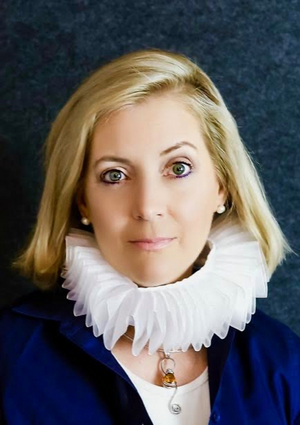Interview: Mary Way and Stacey Walston of The Southwest Shakespeare Company

Perhaps one of the companies most known for their adaptability and evolution within their productions is The Southwest Shakespeare Company (SSC). From its humble beginnings, by founders Randy Messersmith and Kevin Dressler, SSC has always been designed to be an accessible, high-art, and education-based theatre. With the quarantine and subsequent theatre shutdowns, some things have changed but not their mission. They still strive to provide quality, classical theatre to everyone. I sat down and spoke with Executive Director, Mary Way, and Director of Production, Stacey Walston, to have an understanding of their experiences and what they are doing to adapt during these times.
Many companies have had to postpone or cancel their productions due to quarantine. Can you tell us what SSC was working on when this first happened?
S: We were working on a production of Hudson over at the Madison; it was an Arizona premier and our first musical. Over at the Peoria Shakespeare Festival, we had a remount of Richard II. Debra Ann Byrd's show at the Phoenix Art Museum: Becoming Othello: A Black Girl's Journey was also postponed after only a few shows.

M: We were filming a documentary underwritten by a humanities grant. The crew filmed Othello, last year, and the culmination was bringing Becoming Othello here to finish it.
We curtailed one of our biggest educational programs: Shakespeare in the Law. That class typically goes out in May/June to comply with the AZ Bar Ethics continuing education requirements. The lawyers go into their CLE courses with a bit of reproach because it's mandatory every year. We perform interactive shows in pieces, like Merchant of Venice, with a moderator and a panel of lawyers to comment on pathos, ethos, and logos of the show. We often have federal judges that are participating in the audience by telling stories about how these stories or concepts have meted out in their experience.
Are there plans to bring back the postponed productions once theatre comes back full time?
M: We are trying to bring Becoming Othello back in November and in doing so, complete the film as well.
S: Right now, because of the safety, we are looking more at one-person shows to keep the audience and the performers safe.
SSC not only performs for the general public, but its mission includes bringing Shakespeare to schools. Moving forward, how will SSC attempt to continue that mission now that student matinees, touring shows, and live workshops have been canceled?
M: Despite canceling our live shows and workshops, we've been able to virtually visit two to three schools and have put on special performances. If teachers need something, Clay Sanderson has been putting together live plays and talkbacks for whatever students need based on our Saturday night design. We've started getting requests from outside of Arizona, which is something that we hadn't even anticipated!
Via zoom, students ages 12-17 will be able to participate in our summer conservatory. There will be two sessions available June 8 through June 26 and July 6 through July 24. They are comprehensive classes culminating in performances via Zoom.
How is SSC adapting to this New Medium of Virtual Classics Live theatre?
M: The first time we started doing these virtual readings, the audience came in as participants. People were able to use the chat and make comments and stay for a talkback afterward which had that virtual campfire feeling. There were, of course, complications with that, so we changed it to have more technological control for smoother performances.
S: One of the great things is that this series is LIVE. While other theatres are recording and editing their stuff before it's broadcast, there is a sort of anticipation with our shows because you never know what's going to happen in the middle. It's like a battlefield of barking dogs, monsoons, and anything else that comes our way.
What is your goal with these virtual readings and out-of-town talent?
S: What's wonderful is that all of these people have ties to SSC. They are older actors that have done shows with us and/or are on our advisory boards. They also bring a following, so our reach is throughout the country and even worldwide; broadcasting it on Facebook Live helps us reach that audience. These out-of-town actors not only bring in other people that they know can help our little company, but company members get the bonus of working with them too. They are like our extended family.
What is your plan for next season?
M: We are not continuing our previous season. Like Stacey said before, we are going to be offering one-person shows. We plan to offer more shows when the Mesa Arts Center opens with fewer performers on the stage. The weekends will have our headliners and the weeknights will have smaller events; we are calling it our fall festival.
In November, we plan on having Madeline Sayet, the founder of Native Shakes and the director of Yale Indigenous People Performers, perform her show called Where We Belong. The founder of the LA all-female Shakespeare company, Lisa Wolpe, is performing Shakespeare and the Alchemy of Gender. Patrick Page, Hadestown star Antonio in tomorrow's The Merchant of Venice, and has also offered to come to perform his solo show.
S: We are also exploring reader's theatre. This would be a set of eight different plays that a company of actors will be able to engage these great works, like Much Ado and Tempest that we had planned to do last season. We want to still be able to offer them in that format.
What are some ways that people can support SSC during this time?
S: People can support us by going to our virtual shows and sharing to get the word out. That's our biggest challenge. We also have a donation page on our website as well as a patreon page. We are trying to find creative ways to engage with our audience so it's not just about coming to a show. There's so much that's wonderful about Shakespeare - the music, the sonnets - so we want to engage people on all different levels.
M: To that respect, we are doing Sonnet-grams. For a $35 donation, we will send a sonnet or a song and a personal message all over the world. You can request it, and have it performed by one of our fabulous company professionals. We have also had a program where people can sponsor actors as well.
How can the actors in the valley be involved with these great programs SSC has to offer?
S: Shoot us an email at info@swshakespeare.org with your headshot and resume. We want to include everyone in the valley but also around the world. What's great is that I've been getting things from people across the country who saw past Zoom readings and just wanted to come and play. We've met so many wonderful people this way.
What is something that you want people to know about SSC?
M: Live theatrical performance is different than film and television. I love those moments when you can see what happens. You need to see its heartbeat and process. It puts us in touch with the human condition and it bonds us together as a community. I think that's not only what we are trying to offer but also represent. We are also here to elevate, educate, and commune through our commitment to language.
S: We are here to present people classical theatre even if it is in any type of virtual medium. Everything that we are doing, we do to connect with our audiences, but also help engage with people who may be at a higher risk, are unable to go out, and may feel isolated. It's important to make sure that people are okay during this time and that they know we are here for them. It's vital to take care of our mental health. Everyone is significant and no one is alone.
For more information about SSC, you can visit their website at www.southwestshakespeare.org. To order a Sonnet-gram or inquire about sponsoring an actor you can email them at virtual@swshakespeare.org. The Merchant of Venice, SSC's next show featuring Patrick Page, will be broadcast at 6:30 PDT on May 23, 2020.
Comments

Videos

